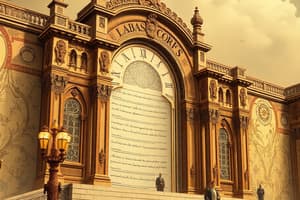Podcast
Questions and Answers
Is the absolute and permanent allegiance of the inhabitants of a territory occupied by the enemy severed by the enemy occupation?
Is the absolute and permanent allegiance of the inhabitants of a territory occupied by the enemy severed by the enemy occupation?
No
What is the distinction made in the text between the sovereignty vested in the titular government and the exercise of the rights inherent thereto?
What is the distinction made in the text between the sovereignty vested in the titular government and the exercise of the rights inherent thereto?
Sovereignty can be distinguished from the exercise of the rights inherent to it. The sovereignty itself cannot be suspended, but the exercise of the rights of sovereignty can be suspended.
What happens to the allegiance of the inhabitants to their legitimate government during enemy occupation?
What happens to the allegiance of the inhabitants to their legitimate government during enemy occupation?
The allegiance of the inhabitants to their legitimate government subsists.
What is the conclusion regarding the sovereignty of the United States in Castine, as mentioned in the text?
What is the conclusion regarding the sovereignty of the United States in Castine, as mentioned in the text?
What happens to the exercise of the rights of sovereignty during enemy occupation?
What happens to the exercise of the rights of sovereignty during enemy occupation?
Where is the recognition of the subsistence of the sovereignty of the legitimate government in a territory occupied by the military forces of the enemy found, according to the text?
Where is the recognition of the subsistence of the sovereignty of the legitimate government in a territory occupied by the military forces of the enemy found, according to the text?
Who filed the petition for habeas corpus in G.R. No. L-409?
Who filed the petition for habeas corpus in G.R. No. L-409?
What was the theory presented in the petition for habeas corpus?
What was the theory presented in the petition for habeas corpus?
What is the nature of the allegiance that a citizen or subject owes?
What is the nature of the allegiance that a citizen or subject owes?
How should the absolute and permanent allegiance be distinguished from the allegiance a foreigner owes to the government of the territory where he resides?
How should the absolute and permanent allegiance be distinguished from the allegiance a foreigner owes to the government of the territory where he resides?
What does the temporary allegiance of a foreigner residing in a territory consist of?
What does the temporary allegiance of a foreigner residing in a territory consist of?
What did the petitioner argue regarding the crime of treason defined and penalized by article 114 of the Revised Penal Code?
What did the petitioner argue regarding the crime of treason defined and penalized by article 114 of the Revised Penal Code?
Flashcards are hidden until you start studying
Study Notes
Sovereignty and Allegiance During Enemy Occupation
- Absolute and permanent allegiance of inhabitants is not severed by enemy occupation; it persists despite the presence of enemy forces.
- Distinction exists between sovereignty held by the titular government and the actual exercise of rights; sovereignty remains but may be hindered.
- Allegiance to the legitimate government remains intact among inhabitants during enemy occupation despite loss of effective control.
Case Analysis: Sovereignty in Castine
- The conclusion regarding U.S. sovereignty in Castine affirms that sovereignty does not vanish even under military occupation.
- Exercise of rights inherent to sovereignty can be impeded by enemy occupation yet does not eliminate the legitimacy of the original government.
Legal Recognition of Sovereignty
- Recognition of the continuity of a legitimate government's sovereignty in occupied territories is established in international law principles.
- Petition for habeas corpus filed in G.R.No.L-409 seeks judicial relief against unlawful detention, representing grounds for challenging the authority of occupying forces.
Allegiance and Treason
- Citizens owe a definite allegiance to their legitimate government, characterized as absolute and permanent.
- Absolute allegiance is distinct from the temporary allegiance a foreigner may owe to the government of the territory of residence, which is non-permanent.
- Temporary allegiance of a foreigner consists of limited loyalty based on residing in a territory but not fully aligning with its government.
- Petitioner contended that treason, as defined by Article 114 of the Revised Penal Code, requires proof of clear intention to betray one's country, which may not be applicable under enemy occupation.
Studying That Suits You
Use AI to generate personalized quizzes and flashcards to suit your learning preferences.




